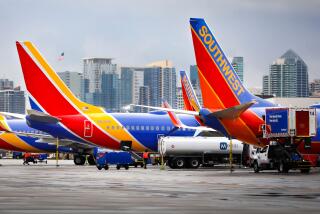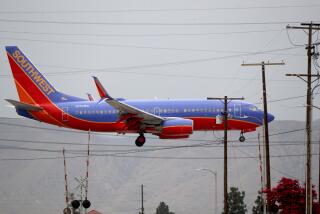Seafirst Bank Fined $697,000 in U.S. Probe : B of A Unit Didn’t Report Large Cash Transactions
- Share via
Seafirst Bank, the Seattle-based subsidiary of BankAmerica, on Monday joined the growing list of U.S. banks that have paid sizable fines for failure to report large cash transactions.
Seafirst was assessed a $697,000 civil penalty for 2,788 violations of the Bank Secrecy Act, which requires banks to report to the Internal Revenue Service all cash transactions in excess of $10,000. The fine covers the period 1980-85 and involves transactions totaling about $465 million.
The bank said it would have no impact on fourth-quarter earnings because a reserve fund had been set up earlier in the year to cover any fine.
Seafirst thus became the eighth major U.S. bank to be penalized this year for violations of the law, which was enacted in 1970 to help law enforcement agencies trace the flow of “dirty” money from drugs, gambling and other illicit activities. About 60 other banks have admitted violations of the law and are discussing possible fines with Treasury Department officials.
The Seattle bank said its unreported transactions involved four Canadian banks and two domestic foreign exchange houses. It denied that it was knowingly involved in money laundering.
Contact With Canadian Banks
“The transactions with these parties showed no indication of criminal activity connected to the transactions,” Seafirst Chairman Richard Cooley said. “There is also no indication of intentional non-compliance by the bank.”
The bank described itself as a major contact with Canadian banks and said it is routinely involved in currency transfers for trade and tourism between the Northwest and Canada. It said it reported the transactions to Customs officials but neglected to provide the information to the IRS.
After Bank of Boston was fined $500,000 for $1.2 billion in unreported transactions in February, Seafirst began an internal review of its reporting practices. At the same time, federal auditors arrived to conduct a scheduled bank examination. The government auditors first spotted the illegal transactions, but the bank was not penalized for failing to voluntarily disclose the violations, a bank spokeswoman said.
“We’ve taken a number of steps to eliminate any future problems. Procedures have been clarified with all personnel involved in such transactions,” Cooley said.
The biggest fine to date was the $2.2 million paid by Crocker National Bank in August for failure to report 7,877 transactions involving $3.89 billion.
More to Read
Inside the business of entertainment
The Wide Shot brings you news, analysis and insights on everything from streaming wars to production — and what it all means for the future.
You may occasionally receive promotional content from the Los Angeles Times.










